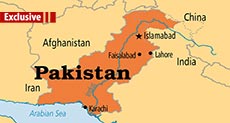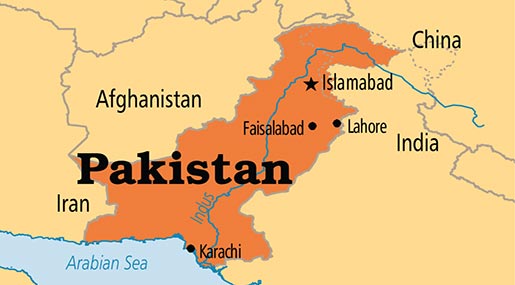
Washington’s Pair of Geopolitical Scissors on the Asian Subcontinent

Darko Lazar
As Pakistan reeled from a deadly terrorist attack on a police training center in Baluchistan's provincial capital, Quetta, another one of Washington's geostrategic adventures in the region became more apparent.

Amid ongoing efforts to sabotage China's ‘One Belt, One Road' development strategy, also known as the new Silk Road, the Americans have mobilized a two-state coalition, whose primary role is to activate and support radical elements on the Asian subcontinent.
A Strategic Partnership?
In September of this year, Afghan President Ashraf Ghani visited India, where he was received as a very important guest. For his part, India's Premier Narendra Modi used every opportunity to highlight the strategic relationship between the two states.
The two men inked a number of interesting agreements, including a billion-dollar donation from New Delhi to Kabul for agricultural and socio-economic development.Over the last couple of years, New Delhi's expenses in Afghanistan, which include the construction of the country's new parliament building in Kabul, have reached a whopping US$ 2 billion.
To say nothing of the fact that Afghanistan's devastated economy has little to offer in exchange for India's billions, this level of cooperation between two countries that do not share a border and have almost nothing in common from an ethno-cultural standpoint comes off as highly unusual.
So what exactly is New Delhi's strategic interest in Afghanistan?
China's Silk Road
Beijing's announced ‘One Belt, One Road' initiative focuses on connectivity and cooperation between China and countries situated on the original Silk Road through Central Asia, West Asia, the Middle East, and Europe. The project, which is believed to have a budget between US$4 trillion and 8 trillion, caused outrage in Washington.
If successful, the initiative would likely complete China's transformation into the world's leading superpower, representing a mortal threat to the hegemony of western capital.
As such, Washington is attempting to exploit existing tensions on the Asian subcontinent, in the hope of restricting China's expansion.
The Americans are effectively creating a pair of geopolitical scissors made up of Afghanistan and India, designed to sever China's new Silk Road in its most vulnerable place - Pakistan.
The China-Pakistan Economic CorridorLast year, Beijing and Islamabad signed a US$51 billion agreement, which came to be known as the China-Pakistan Economic Corridor [CPEC]. The value of the project is estimated to equal all foreign direct investment in Pakistan since 1970. It includes the construction of liquefied natural gas and oil pipelines, as well as a vast network of highways and railways stretching from China to Pakistan's Arabian Sea port of Gwadar [Baluchistan province].
The port of Gwadar, which forms the crux of the CPEC project, would also serve to connect China to the Middle East, reducing the present-day journey by some 10,000 kilometres.Moreover, for Beijing this alternative transportation corridor is literally a matter of life and death. Should Washington-fuelled tensions in the South China Sea escalate, maritime activity in the area would grind to a halt, which would be catastrophic for Chinese industry.
Meanwhile, Pakistan's Prime Minister Nawaz Sharif, whose country is already a major buyer of Chinese-made weaponry, has been stepping up security cooperation with Beijing. Joint military exercises, which included a simulated aerial defence of Pakistani territory this year, have become more frequent.
Inaugurating August's CPEC Summit in Islamabad, the Pakistani Premier said that the initiative would "bring progress, prosperity, and peace to... the entire region."
But the CPEC initiative has some very powerful enemies.
Islamabad's Betrayal
Over the years, Washington's political elite has become accustomed to treating Pakistan as an obedient satellite state. Thus Islamabad's shift towards Beijing is being treated as an act of betrayal in the US.In response, the Americans have cancelled US$ 300 million of previously promised military assistance to Pakistan, alleging that Islamabad has become inactive in the battle against terrorism.
The unsubstantiated allegations come despite Pakistan's massive anti-terrorist operations in Karachi, North Waziristan and a number of other provinces, during which some extremist formations were completely eliminated.
However, Washington and its allies in Asia are openly accusing Islamabad of supporting terrorists.
During a visit to New Delhi in August, US Secretary of State John Kerry, called on Pakistan to join other nations in fighting terrorists within its borders.His Indian counterpart and host, Sushma Swaraj, went a step further by saying that Pakistan must cease to provide a "safe haven for terror groups and criminal networks".
Days earlier, the US and India signed an agreement, which allows the American military to use Indian land, air and naval bases for repair and resupply.
The agreement has not been made available to the public in its entirety, but Reuters described it as seeking to "counter the growing maritime assertiveness of China".
On September 15, Washington and New Delhi staged joint-military exercises along China's southern border, bringing into sharper focus the evolution of an anti-Pakistani-anti-Chinese pact.
Baluchistan in the CrosshairsDuring India's Independence Day celebrations on August 15, Narendra Modi accused Pakistan of occupation, not just in the contested Kashmir province, but also in Baluchistan.
The south-western Pakistani province, which has a diverse ethnic population, has long been a hotbed of separatist militant groups.Completely ignoring the sensitivities surrounding this topic in the neighbouring country, Modi spoke about human rights violations in Baluchistan, claiming to have received pleas for assistance from its people, which would not "remain unanswered".
But according to Pakistan's Inter-Services Intelligence [ISI], India is already using its consulate in the Afghan city of Kandahar to finance and train separatists from Baluchistan. Islamabad submitted these findings to the United Nations over a year ago.
Meanwhile, US and British intelligence documents released by Wikileaks confirm New Delhi's support for Baluchistan's separatists.The sub-context of these revelations, in addition to Modi's rhetoric, is extremely important in that the destabilization of Baluchistan targets a key component of the China-Pakistan Economic Corridor.
The Springboard for Destabilising Pakistan
Interestingly, a Chinese-Pakistani initiative aimed at ending hostilities in Afghanistan brought all of the country's warring factions to the negotiating table not too long ago.
Just when success was imminent, Washington launched an information war against the leader of the Taliban, Mullah Omar, resulting in an internal power struggle within the militant group and the eventual abandonment of the peace process.Several months later, Beijing and Islamabad managed to resuscitate the dialogue, but this time, both the US and India openly sabotaged the proceedings.
Negotiations were finally laid to rest after the Americans killed the new leader of the Taliban, Akhtar Mansour, in a drone strike on May 21, 2016.
The fallout from the elimination of Mansour led to the emergence of an even more radical Taliban, which gave rise to an agreement with Daesh, allowing the terror group freedom of movement across two Afghan provinces - Nangarhar and Kunar [both bordering Pakistan].
The real beneficiary from the failed peace talks, however, is Washington. Ongoing hostilities in Afghanistan give the Americans the excuse they need to maintain and bolster their military presence. More importantly, the failed peace talks have preserved the civil war, allowing Washington to export instability into neighbouring states.This week's attack in Quetta, which killed 61 people, attests to the fact that Afghanistan is being used as the springboard to destabilise Pakistan.
"We came to know from the communication intercepts that there were three militants who were getting instructions from Afghanistan," said a senior Pakistani military commander in Baluchistan, General Sher Afgun.
Sadly, this level of violence and chaos will likely become the new reality in the region, as Washington works to supress the advancement of its geopolitical adversaries.
Source: Al-Ahed News


